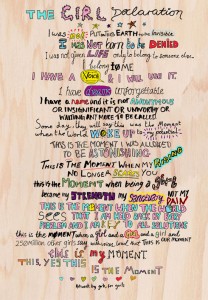“Does a rake deserve to possess anything of worth, since he chases everything in skirts and then imagines he can successfully hide his shame by slandering [women in general]?”
― Christine de Pizan, Der Sendbrief vom Liebesgott / The Letter of the God of Love
This is the song that does not end….a children’s song that plays over and over again once it’s stuck in your head. At this point, this is how I am coming to feel about blogging – when I look at the last two years I am disturbed by the repetitiveness of the stories which seem to demand a theological response. Nowhere is this more acute than on the subject of sexual assault and rape culture. All week I have been struggling with whether or not to write something on the Maryville Case (Please see the Kansas City story for a detailed account of the facts). The prevalence of sexual assault against women and girls is something that I blogged about repeatedly last spring –on patriarchy, on the effects of dismissing harassing behavior as boys will be boys, on sexual harassment at the NYC Ballet, and the subversive way the arts can challenge us to think about patriarchy. In frustration then, I write because structural violence needs to be named and repeatedly called out if we are to dismantle its power.
The Blogosphere has spent considerable space debating rape culture in the last year, and yet, I continue to be horrified by just how common and repetitive the cases are. While there are differences, the repetitiveness with which victims are blamed, shamed, and shunned is sickening. Did Daisy Coleman make a bad decision sneaking out to meet 17 year old boys? Yes. Does that somehow change the fact that she was raped? NO. Since they were charged based upon intoxication and not statutory rape, most of the conversation seems to gloss over the very simple reality – Daisy was 14 and her friend 13; neither were capable of giving legal consent. Daisy herself refuses to be silenced. This summer a Montana judge made headlines after sentencing a 53 year old teacher to 30 days for raping a 14yr old student. The judge claimed she was “older than her age” and that the troubled student was as in control as the teacher. The young girl committed suicide.
David Zirin at The Nation has an excellent and provocative article examining the way jock culture contributes to the perpetuation of rape culture and victim blaming. While I agree with Zirin’s analysis of what he labels “jock culture,” the roots of rape culture and victim shaming go much deeper – all the way back to chivalric romances and beyond. In the 14th Century, The Romance of the Rose and other stories of courtly love were all the rage at French Court. As the allegory of the rose indicates, a woman’s love and sexuality is both dangerous and fickle. This genre of literature holds up women as either unattainable or sexual temptresses – the virgin or the whore. Yet, in the fourteenth century, one strong and eloquent woman – Christine de Pizan – used her education to argue for the full humanity and dignity of women. In City of Ladies, Christine de Pizan imagines a city in which women’s gifts are respected and flourish (the similarities between Christine’s responses to men’s arguments against educating girls and Malala’s are worth noting). Moreover, her willingness to speak to the structures of power of her day—despite her relative youth, despite the fact that social norms went against what she had to say—resonates with Daisy Coleman’s refusal to be silenced. For Daisy Coleman, as for Pizan, the issue is a moral one. In Pizan’s words:
“I will show you the great contradiction in what the men say about the changeability and inconstancy of women. It is true that they all generally insist that women are very frail [= fickle] by nature. And since they accuse women of frailty, one would suppose that they themselves take care to maintain a reputation for constancy, or at the very least, that the women are indeed less so than they are themselves. And yet, it is obvious that they demand of women greater constancy than they themselves have, for they who claim to be of this strong and noble condition cannot refrain from a whole number of very great defects and sins, and not out of ignorance, either, but out of pure malice, knowing well how badly they are misbehaving. But all this they excuse in themselves and say that it is in the nature of man to sin, yet if it so happens that any women stray into any misdeed (of which they themselves are the cause by their great power and longhandedness), then it’s suddenly all frailty and inconstancy, they claim. But it seems to me that since they do call women frail, they should not support that frailty, and not ascribe to them as a great crime what in themselves they merely consider a little defect.”
― Christine de Pizan, The Book of the City of Ladies
In case there is any doubt of how far afield our society is from regarding rape as a tragedy, consider that after the verdict, other girls wore t-shirts saying “Matt 1 Daisy 0.” A jock culture that views forced sex as a “score” and acquittal as a “win” is an impoverished way to make women of girls. Christine de Pizan recognized the hypocrisy of the medieval culture of courtly love, of indicting women for a litany of sins that were dismissed in men. She notes throughout her writings that women are created equally in the image and likeness of God. It is maddening that in 2013 we need to continue to fight for this very basic point – the full human dignity of women and girls. Around the world, being born female too often leads to a socially-contrived determinism. A powerful recent documentary reminds us that the three most dangerous words are “it’s a girl,” as we face the reality of sex-selective abortions around the world. As recent rape cases in the U.S. have demonstrated, being woman is too often akin to being undervalued and unprotected in a power system that glorifies—and then forgives–male violence, while foisting the rhetoric of blame onto women. And these cases remind us the fight for equal dignity of girls is not simply over there in other places; it’s in our own backyard.
And so with Christine de Pizan, there is a long history of courageous, enraged, and abused women who refused to be silent . Instead, we are called to be brave.
And since your history of silence / Won’t do you any good, /Did you think it would?
Let your words be anything but empty / Why don’t you tell them the truth?/
Say what you wanna say/ And let the words fall out/ Honestly I wanna see you be brave (Sara Bareilles, Brave)





Trackbacks/Pingbacks